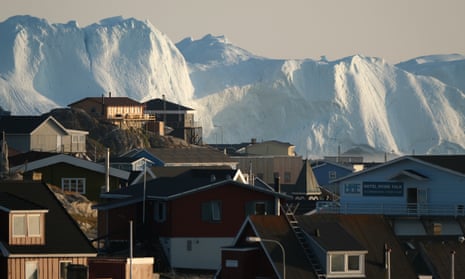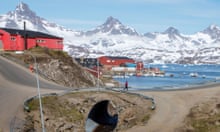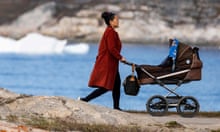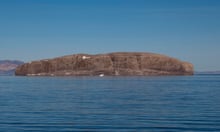The Greenlandic Perspective Survey tells us that 90% of Greenlanders accept that climate change is happening. More than that, it’s making them anxious and depressed. Given that they live in cultural and climactic conditions that put them at the frontline of ecological change, we might be well advised to take their thoughts and feelings seriously. Where they go, we may very well follow.
At opposite ends of the climate spectrum – from the parched landscape of New South Wales to Greenland’s melting sea ice – people are finding the need for new words to describe the mental health issues linked to environmental change. In 2003 the Australian philosopher Glenn Albrecht coined the term solastalgia to describe the anguish caused by environmental alterations due to droughts and destructive mining. Taking the Latin word for comfort (sōlācium) and the Greek root designating pain (-algia) he gives us a neologism that sums up the devastating effects of finding unease where you used to look for relief.
If the world around you once promised to be a place that provided a certain amount of food, shelter and consistency, how might you feel as it gradually becomes a place of extreme unpredictability and risk? In Greenland, the north Baffin Inuit have the word uggianaqtuq to describe the unpleasant feeling caused by a friend behaving strangely, or even a sense of homesickness experienced when one is actually at home. More recently, this word has been coopted to describe volatile weather conditions and the sense of one’s surroundings becoming unreliable – storms brew more suddenly and last for longer, the ice is thinner and food is noticeably more scarce. Where you used to be able to sustain yourself by hunting, fishing and foraging, now you may have to supplement this with trips to the newly established supermarket. But how are you supposed to pay for the food? And what if you can no longer afford to feed your dog?
Alongside these more specialised-sounding terms we also have the more self-explanatory “ecological grief” and even the idea of a kind of post-traumatic stress linked to the state of the planet. This last idea might sound strange – how can it be post-traumatic when the worst is yet to come? Can you be traumatised by something that’s still happening or even, according to some, might not happen at all?
In the 19th century, the French neurologist Jean-Martin Charcot linked the apparently nonorganic symptoms of hysteria (a diagnosis he also believed could be applied to men) to the speed of modern life. He believed that previously unprecedented accidents related to industrial machinery and mechanised travel could have traumatising effects. After experiencing, or even nearly experiencing, a technologically related shock you might find yourself unable to process it mentally – it all happened too fast, too hard, too unnaturally to be thinkable. Human minds were simply not equipped to deal with the changes that were taking place in the world around them.
Whatever you make of Charcot’s outdated, politically problematic medical categories, his idea of unthinkable transformation surely resonates. For all but the most stalwart climate change deniers something is definitely under way. But how exactly it will manifest itself, and how it will feel, is impossible to predict. Is it really true that we only have 50 more harvests at the current rate of consumption? Might there be advantages for some as well as devastation for others? What impact might a vast reduction of resources have on human behaviour?
To many it seems we already have one foot planted in an unbearably dystopian future. How long will it be before political systems collapse and we turn against one another in a frenzy for the last scraps of sustenance? (Or any other imaginable form of mass-inflicted horror?) To others this sort of scenario is delusional, a symptom of media-fed panic. Both “realities” are subject to questioning. Who’s to say who’s madder?
In order to experience one’s present reality as anything like a comfortably consistent set of conditions one has to include a calculation around the future. Some people are inclined to catastrophise while others prefer to blot out the possibility of unpleasantness. Both tendencies could be said to be attempts at self-preservation. Should you act pre-emptively to avert disaster, opening yourself up to accusations of being pathologically anxious, or keep calm and carry on at the risk of seeming at best obtuse or at worst selfishly destructive? Is it mad to mourn something before you’ve lost it? This is perhaps a particularly poignant question for a generation of young people currently asking themselves seriously whether or not it’s irresponsible to have babies, many opting not to for fear of what the near future holds in store.
In a sense, all responses to the current ecological climate are mad, or at least maddening. Take the threat seriously and risk succumbing to solastalgia, or blot it out and be accused of opting out of reality. In the first case you madden yourself and in the second you madden other people. It can sometimes seem that the only reasonable response is melancholia, anger and helplessness. In the words of Dr Courtney Howard, board president of the Canadian Association of Physicians for the Environment: “The intersection between the climate emergency and mental and physical health will become one of the world’s major issues.”
For anyone with their ear to the ground, this is obviously already the case.









